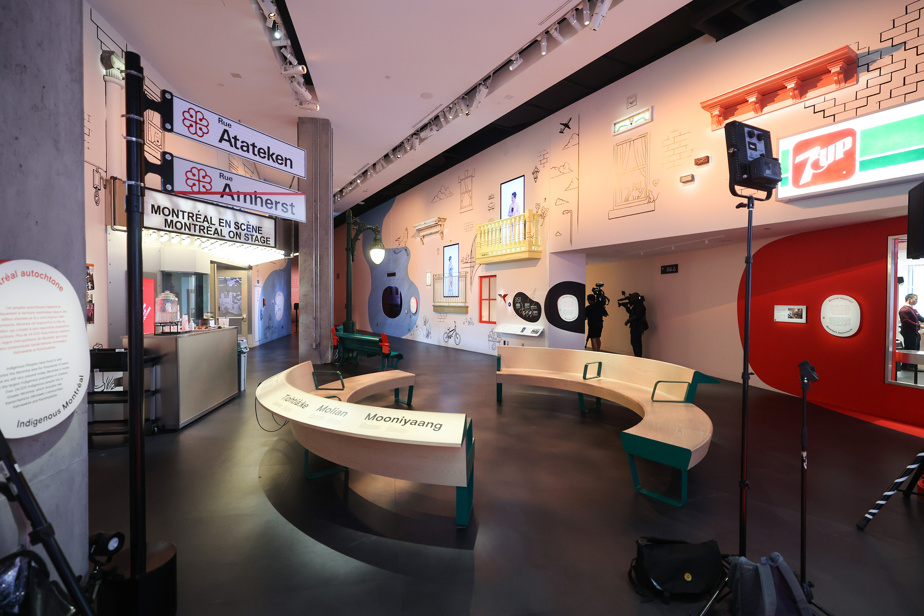This is the new name of the former Montreal History Center, built in the Quartier des spectacles, between the Cléopâtre cabaret and the Central restaurants, at the corner of Saint-Laurent Boulevard and Sainte-Catherine Street. A space dedicated to the history of Montreal, but above all to the – multiple – stories of Montrealers.
As soon as we enter this museum of Montreal memories, the imagery of Montreal is displayed, in a decor that is both fun and friendly, which is inspired by the nomenclature of the City. “Public square”, “terrace”, “alley”, “belvedere”…
From the illuminated signs of businesses that no longer exist (like Le club 281 or La Boîte noire) to road signs (with a little game called: can we park here?), including the recreation of a convenience store, murals or even the exhibition of multicolored balls by landscape architect Claude Cormier (recently deceased), the visitor will quickly find himself on familiar ground.
A citizen exhibition on the Chaînon occupies part of the public space. A way to highlight the people who contributed to the sustainability of this women’s shelter founded 90 years ago. Video clips are made available to visitors. We can notably listen to the testimony of Lucie Morrissette, a woman who began volunteering for the organization at the age of 22.
Testimonials. We will hear this word often during the visit organized for the media. And for good reason. The Montreal Memories Center (MEM), which will be officially opened to the public on October 6, has more than 700 audio and video testimonies from Montrealers, many excerpts of which are available to us.
A temporary exhibition (paid) called Detours, urban encounters presents 18 Montrealers who have atypical backgrounds and who we discover through short videos. The scenography is by Pierre-Étienne Locas, well known in the theater community.
For example, we meet Maxime St-Denis, a fir tree seller from the Center-Sud, the dancer Lazylegsz (Luca Patuelli), who lives with a muscular disease that affects his legs; the owner of the restaurant Les îles en ville, Ginette Painchaud; the trans artist Kama La Mackerel or these two Italian sisters who grow fruit in their garden and who collaborate with the organization Les Fruits Forbiddens.
The head of culture and heritage on the executive committee of the City of Montreal, Ericka Alneus, present at the inauguration, particularly appreciated this segment of the MEM. “It’s an exhibition that confronts us with other realities,” she told us. I find that the MEM has something very moving. People will smile, they will laugh, they will find each other and that will allow people from elsewhere to discover us. »
But the central element of the MEM is a permanent exhibition simply titled Montreal, which will attempt to answer two questions: What is Montreal? and who is Montreal?
Unfortunately, this (paid) exhibition, which will include numerous interactive stations with audio and video content, will not be ready on October 6… The section head, exhibition collections and programming, Catherine Charlebois indicated that the firm with which the MEM worked – Halo Création – had declared bankruptcy. The museum is therefore looking for a new supplier to complete the work, but the exhibition will not be open to the public for a few months.
La Presse was still able to enter the space dedicated to this exhibition divided into several sections.
In addition to oral testimonies from Montrealers, visitors will enjoy the “At Home” section, particularly with these objects or products that we once kept in our cupboards. For example, the first boxes of Catelli pasta, jars of spicy Manba peanut butter, Jehane Benoit’s recipe book, Steinberg paper bags and even newspaper archives.
Another fun section: objects that are part of our collective memory. The Montreal metro logo, a Montreal Canadiens jersey, a lunch box bearing the image of Expo 67, a poster from the Belmont amusement park, Victor, the mascot of the Just for Laughs festival, a rainbow flag rainbow, etc. In short, so many artifacts that are part of the MEM’s collection of some 10,000 objects.
A selection of photographs representing emblematic places in the metropolis was made by Montrealers. We will see giant photos of these places parade around us, in a circular space. Finally, an immense sculptural work called The constellations of the seahorse was created by the artist Raphaëlle de Groot, who was inspired by the functioning of memory.
